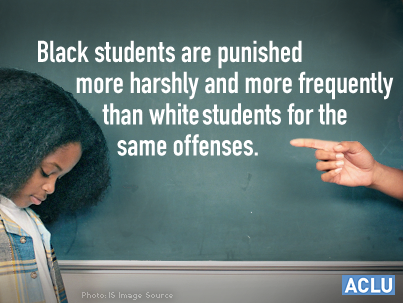Key Tool Issued to Help End School-To-Prison Pipeline
FOR IMMEDIATE RELEASE
CONTACT:
Tom Hargis, 832.291.4776, [email protected]
Shawn Jain, 202.417.7547, [email protected]
WASHINGTON – The Department of Education and Department of Justice today released federal guidance to assist schools in administering discipline in a nondiscriminatory way and to provide alternatives to overly punitive school discipline practices.
In the guidance, the agencies have stated what we have known to be true for a long time: race discrimination in school discipline is a real problem. Students of color are punished more frequently and more harshly for the same infractions. Data from the 2011-2012 Civil Rights Data Collection provide a national snapshot of the reach of punitive school discipline policies. For example, black students make up 44 percent of students suspended more than once and 36 percent of students expelled, though they represent only 15 percent of students.
"With the rise of law enforcement in our schools, the proliferation of zero-tolerance policies, and misuse of suspensions and expulsions, our nation’s school discipline policies are pushing children, most of whom are students of color and students with disabilities, out of school," said Deborah J. Vagins, ACLU senior legislative counsel. "Today, the federal government has issued groundbreaking guidance that will help all school districts end misguided, discriminatory school discipline policies. This guidance makes it crystal clear for schools what their obligations are under our civil rights laws and provides examples of best practices so that they can easily implement positive alternative practices. This is a victory for all who care about creating environments where students can thrive.”
“Texas has disproportionate suspension and expulsion rates for African American students,” said Matthew Simpson, policy strategist for the ACLU of Texas. “This data and new guidance from the Department of Justice should help school administrators determine why such discrepancies exist and address the disproportionate use of expulsion and suspension.”
Though the guidance does not call for the elimination of law enforcement or school resource officers (SROs) in schools, it does provide important guiding principles for their proper role with respect to discipline. This includes improved training and a clear delineation of roles so that officers are not responsible for handling minor discipline.
Texas has a history of school-based law enforcement being involved in minor disciplinary issues. Recently, new laws were passed to reduce the use of ticketing in schools to enforce school discipline, but in 2010 approximately 300,000 class C tickets were issued for minor misbehavior like swearing or chewing gum.
The state of Texas also does not maintain a strong statewide reporting system for data on arrests, uses of force, tickets issued, and a variety of other police activities on public school campuses. The federal guidance should encourage schools to gather and make public this information, despite the lack of a statewide reporting system.
The ACLU continues to advocate for additional measures to reduce over-reliance on punitive school discipline practices and to protect the civil rights of young people. This includes congressional passage of federal bills promoting positive behavior supports and ending corporal punishment, among others, and the administration collecting data on new categories of punitive school discipline that provide a more complete view of punishments administered to students, such as the total incidents of corporal punishment and reasons for referrals to law enforcement.
The development and release of the federal guidance is the result a collaborative project—the Supportive School Discipline Initiative—between the Department of Education and Department of Justice. It is also a result, in part, of the longstanding advocacy of the ACLU and other organizations committed to ending the school-to-prison pipeline.
The full guidance is available at: http://www.ed.gov/school-discipline/
Stay Informed
Sign up to be the first to hear about how to take action.
By completing this form, I agree to receive occasional emails per the terms of the ACLU’s privacy statement.
By completing this form, I agree to receive occasional emails per the terms of the ACLU’s privacy statement.

